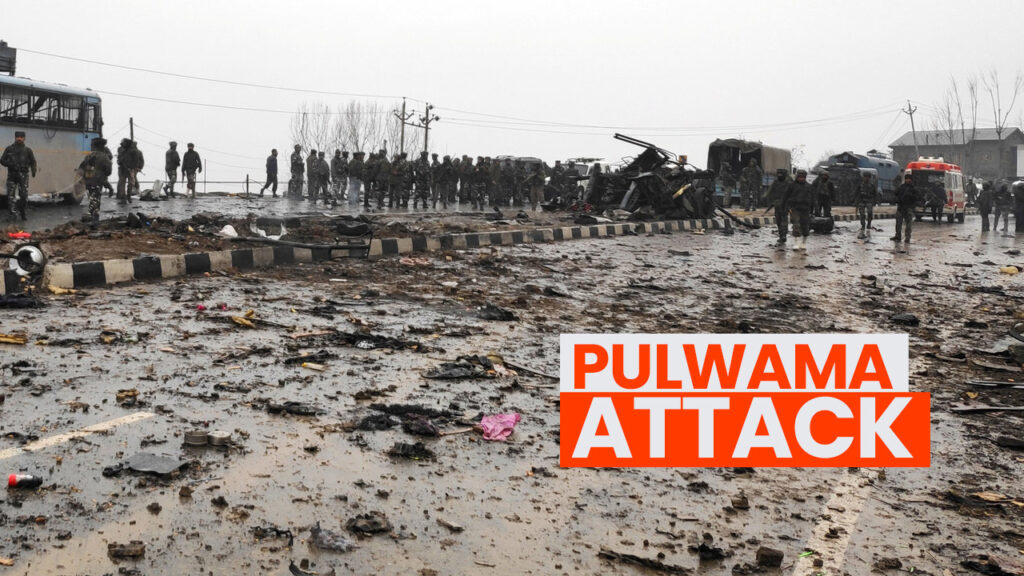
Latest NewsLecturette
PULWAMA ATTACK – BLACK DAY
The Pulwama attack occurred on February 14, 2019, in the Pulwama district of Jammu and Kashmir, India. A convoy of vehicles carrying Indian security personnel was targeted by a suicide bomber, resulting in the deaths of 40 Central Reserve Police Force (CRPF) personnel and injuring many others. The attack was one of the deadliest in the region in decades and led to heightened tensions between India and Pakistan, as the responsibility was claimed by the Pakistan-based militant group Jaish-e-Mohammed. The incident sparked international condemnation, and India took diplomatic and military actions in response.

Here’s a more detailed overview of the Pulwama attack:
- Background: The attack took place against the backdrop of the long-standing conflict over the region of Kashmir between India and Pakistan. Kashmir has been a flashpoint for tensions between the two nuclear-armed neighbors for decades, with both countries claiming the region in its entirety but controlling only parts of it.
- Attack Execution: Adil Ahmad Dar, a local Kashmiri youth radicalized by militancy, carried out the suicide bombing. He drove a car loaded with explosives, estimated to be around 200-300 kilograms, into a bus carrying CRPF personnel as part of a larger convoy traveling from Jammu to Srinagar.
- Casualties: The explosion resulted in the deaths of 40 CRPF personnel and injuries to many others. It was one of the deadliest attacks on Indian security forces in Kashmir in recent years.
- Jaish-e-Mohammed Involvement: Jaish-e-Mohammed, a Pakistan-based militant organization, claimed responsibility for the attack. The group is known for its extremist ideology and has been designated as a terrorist organization by several countries, including India, the United States, and the United Nations.
- Adil Ahmad Dar: The suicide bomber, Adil Ahmad Dar, was a 20-year-old local Kashmiri from the Pulwama district. He had joined Jaish-e-Mohammed months before the attack and recorded a video message pledging allegiance to the group, which was later released by the organization.
- Immediate Aftermath: Following the attack, India launched a massive security operation in the region, conducting searches and raids to apprehend suspected militants. There was also a significant increase in security measures, including heightened vigilance along the Line of Control (LoC) between India and Pakistan.
- International Response: The Pulwama attack prompted widespread condemnation from the international community, with countries expressing solidarity with India and condemning terrorism in all its forms. The United States, France, the United Kingdom, Russia, and other countries offered support to India in its fight against terrorism.
- India’s Response: In response to the attack, India took several measures to isolate Pakistan diplomatically and exert pressure on the country to take action against terrorist groups operating from its soil. India revoked Pakistan’s Most Favored Nation (MFN) status and launched a diplomatic offensive to garner international support.
- Military Response: On February 26, 2019, India conducted airstrikes targeting alleged Jaish-e-Mohammed training camps in Balakot, Pakistan, in what was termed as Operation Balakot. This marked the first time since the Indo-Pakistani War of 1971 that India conducted airstrikes deep inside Pakistani territory.
- Escalation and De-escalation: The Pulwama attack and subsequent military actions by India led to a significant escalation of tensions between the two countries, raising fears of a potential conflict. However, both countries eventually took steps to de-escalate tensions, with Pakistan releasing a captured Indian pilot as a gesture of goodwill.
- Impact: The Pulwama attack had far-reaching implications, not only in terms of the loss of lives and the escalation of tensions between India and Pakistan but also in terms of its impact on regional security dynamics and the global fight against terrorism. It underscored the urgent need for concerted efforts to address the root causes of extremism and promote peace and stability in the region.







